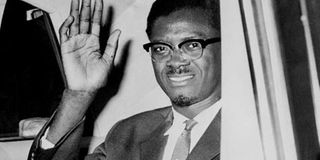Totally unknown in 1955, by 1958 he had become a nationalist figurehead

Former Democratic Republic of the Congo Prime Minister Patrice Lumumba. One is left wondering what DRC would be today if Lumumba had been left to rule. FILE PHOTO
What you need to know:
- Lumumba was shot dead in Katanga together with fellow nationalists after several harrowing days of torture by their captors – led by then President Joseph Kasavubu and head of the military Joseph-Desire Mobutu (later President Mobutu Sese Seko).
- These questions are even more urgent today as the DRC seems to be permanently caught in a cycle of chaos, death and destruction.
- But this “colonial order” wasn’t likely to let go of its privilege and access to the immense resources.
On January 17, 1961, Patrice Lumumba was assassinated. Not many Kenyans and Africans remember this today.
Yet Lumumba’s murder remains one of the most tragic moments in Africa’s anti-colonial struggles.
He was not just the Prime Minister of the Congo (now the Democratic Republic of Congo), he also stood for the aspirations of millions of Africans who were shedding off the cloak of colonialism.
There is no doubt that the ghost of Lumumba haunts DRC to date.
Lumumba was shot dead in Katanga together with fellow nationalists after several harrowing days of torture by their captors – led by then President Joseph Kasavubu and head of the military Joseph-Desire Mobutu (later President Mobutu Sese Seko).
Lumumba’s crime was that he was a nationalist. He desired a united Congo.
The departing Belgian colonisers were not willing to fully hand over such a rich country.
Lumumba thought otherwise and mocked the Belgians. They didn’t take it lightly.
This is why reading or rereading Ludo de Witte’s book, The Assassination of Lumumba, 17 years since its publication, still horrifies.
One is left wondering what DRC would be today if Lumumba had been left to rule.
How would the country have turned out if its incipient political elite hadn’t sold out to the Belgians and other Europeans prospecting for minerals?
What would Congolese nationalism have meant for the continent?
RUFFLED FEATHERS
These questions are even more urgent today as the DRC seems to be permanently caught in a cycle of chaos, death and destruction.
It seems to be permanently at war since Lumumba’s death despite or in spite of Mobutu’s supposed years of peace and prosperity.
In The Assassination of Lumumba De Witte refutes much of the “prevailing opinions about Lumumba” and his legacy, even among Africanists, arguing that it is often “non-scientific.”
Indeed his book is the result of intensive and extensive research of other books, academic writing, memoirs and letters from individuals who were directly involved in the affairs of the Congo in the time of Lumumba’s murder, official archives at the United Nations and of the government of Belgium – two major players in this tragedy et cetera.
As he argues himself, “… the research material gathered [in his book] cannot possibly be refuted by those Africanists who interpret the crisis on the basis of clichés spread by Western propaganda of bygone days.”
De Witte names those who actually executed Lumumba, led by senior Belgian security officers; accuses the UN of complicity and indifference; questions Russia’s “disinterest”; and even dispels the myth that this was America’s CIA job.
For De Witte, “When Lumumba was alive, the contours of his political curve were barely visible. The man was a political meteor. Totally unknown in his country in 1955, by 1958 he had become a nationalist figurehead capable of leading the masses. In 1960 he was prime minister for 10 weeks before his assassination in 1961. Lumumba was the product of a lightning transformation of political life in the Congo between 1958 and 1960. His tumultuous political evolution went hand in hand with the radicalisation of Congolese politics which, in turn, was the expression of the rapid collapse of the colonial order.”
But this “colonial order” wasn’t likely to let go of its privilege and access to the immense resources.
This is why individuals like Lumumba posed a headache for the economic order/class, on which the colonial political institutions were based.
NOT BOTHERED
African leaders like Lumumba or Kwame Nkrumah, who spoke the language of nationalism and equity, threatened the interests of capitalism.
It is not surprising that De Witte indicts both the government of Belgium and Belgian business interests for the decision to eliminate Lumumba.
The tragedy of Lumumba’s short political life should always be an enduring lesson for African nationalists.
It is fellow Congolese who betrayed him, with some being “paid off” with scholarships for their children to study abroad, others with meaningless colonial honours, while others enjoyed champagne.
In Kenya, we did not even bother to talk about land restitution, the real point of conflict between the colonisers and the “natives”.
In fact our educated, economic and political elite simply took over from the mzungu and carried on with his practices.
So, if you bother about Lumumba’s legacy, remember Kenya also assassinated nationalists like Tom Mboya, Pio Gama Pinto, JM Kariuki — and continue asking for the rights of Kenyans.
The writer teaches literature at the University of Nairobi





